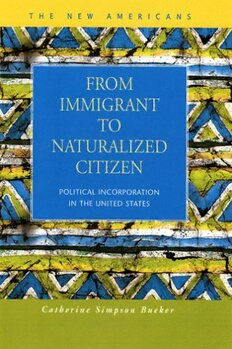
From Immigrant to Naturalized Citizen: Political Incorporation in the United States (The New Americans: Recent Immigration and American Society) PDF
241 Pages·2006·1.103 MB·English
Most books are stored in the elastic cloud where traffic is expensive. For this reason, we have a limit on daily download.
Preview From Immigrant to Naturalized Citizen: Political Incorporation in the United States (The New Americans: Recent Immigration and American Society)
Description:
Bueker finds that naturalizing and voting are distinct processes. Levels of education, income, and length of eligibility, predict both processes, but an immigrant’s country of origin frequently overrides these other characteristics and works differently in each. Immigrants from countries with the highest likelihood of naturalizing tend to have the lowest odds of voter turnout, while those immigrants from countries with the lowest odds of citizenship acquisition are the most likely to vote, once naturalized. Further, country of origin matters as much for how it interacts with other key characteristics, such as education and income, as for the independent influence it exerts on these two political processes.
See more
The list of books you might like
Most books are stored in the elastic cloud where traffic is expensive. For this reason, we have a limit on daily download.
